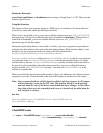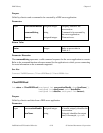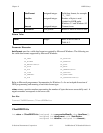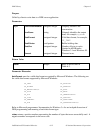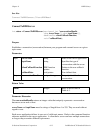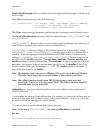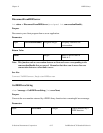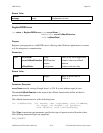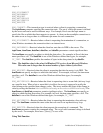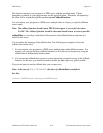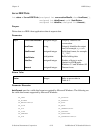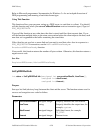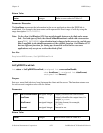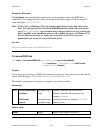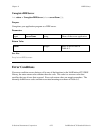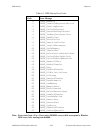
Chapter 6 DDE Library
© National Instruments Corporation 6-17 LabWindows/CVI Standard Libraries
DDE_DISCONNECT
DDE_DATAREADY
DDE_REQUEST
DDE_ADVISELOOP
DDE_ADVISESTOP
DDE_EXECUTE
DDE_CONNECT—This transaction type is received when a client is requesting a connection.
The topicName parameter specifies the connection topic. The set of valid topic names is defined
by the server and can be used in different ways. For example, Excel uses the topic name to
specify the file on which the client requests to operate. A client can have multiple connections to
the same server as long as there is a different topic name for each connection.
DDE_DISCONNECT—Received when a client is requesting the termination of a connection, or
when Windows terminates the connection due to an internal error.
DDE_DATAREADY—Received when the client has sent data via DDE to the server. The
topicName, itemName, dataFmt, dataSize, and dataPtr parameters contain significant data.
The itemName can specify an object to which the data refers. For example, in Excel, the item
name specifies a cell. The dataFmt is one of the Windows-defined data types, for example,
CF_TEXT. The dataSize specifies the number of bytes in the data pointed to by dataPtr.
Note: The dataSize value is the value LabWindows/CVI receives from Microsoft Windows.
This value can be larger than the actual number of bytes written by the client.
DDE_REQUEST—Received when the client is requesting that data be sent to it via DDE. The
itemName can specify an object to which the data refers. For example, in Excel, the item name
specifies a cell. The dataFmt is one of the Windows-defined data types, for example,
CF_TEXT.
DDE_ADVISELOOP—Received when the client is requesting a hot or warm link (advisory loop)
on a specific item. When a hot or warm link is in effect, the server is supposed to notify the
client whenever the specified item changes value. The server notifies the client of the change in
value by calling the function AdviseDDEDataReady or BroadcastDDEDataReady. The
itemName and dataFmt parameters contain significant values. The itemName can specify an
object to which the data item refers. For example, in Excel, the item name specifies a cell. The
dataFmt is one of the Windows-defined data types, for example, CF_TEXT.
DDE_ADVISESTOP—Received when the client is requesting the termination of an advisory
loop. The itemName contains the same value that was used to set up the advisory loop.
DDE_EXECUTE—Received when the client requests the execution of a command. The
itemName parameter contains the command string. The set of valid command strings is defined
by the server. For example, Excel uses "[Save()]" to save a file.
Using This Function



